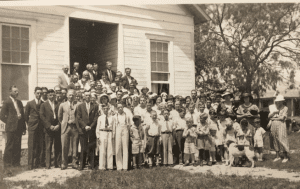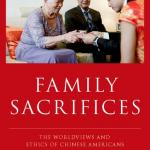 In July 1934, the deacons met at First Baptist Church Elm Mott, a Southern Baptist church near Waco, Texas. They voted unanimously to invite Mrs. Lewis Ball of Houston to come as their revival preacher. As the church minutes record (and as I have written about before): the deacons recommended that “the church ask Mrs. Lewis Ball of Houston to assist us one week during our coming revival, she being a great inspiration and an outstanding Soul winner.” Mrs. Lewis Ball not only had charge of the morning services and delivered evening messages for the young peoples’ prayer meeting at the 1934 summer revival, but she preached to the largest crowd yet recorded at FBC Elm Mott: an audience of 139. At least 6 people professed faith in Jesus after her sermon, “Is it Well With Your Soul?” 16 baptisms resulted from the revival overall. Mrs. Lewis Ball proved such a popular preacher that she was asked to return in 1935 and again in 1938.
In July 1934, the deacons met at First Baptist Church Elm Mott, a Southern Baptist church near Waco, Texas. They voted unanimously to invite Mrs. Lewis Ball of Houston to come as their revival preacher. As the church minutes record (and as I have written about before): the deacons recommended that “the church ask Mrs. Lewis Ball of Houston to assist us one week during our coming revival, she being a great inspiration and an outstanding Soul winner.” Mrs. Lewis Ball not only had charge of the morning services and delivered evening messages for the young peoples’ prayer meeting at the 1934 summer revival, but she preached to the largest crowd yet recorded at FBC Elm Mott: an audience of 139. At least 6 people professed faith in Jesus after her sermon, “Is it Well With Your Soul?” 16 baptisms resulted from the revival overall. Mrs. Lewis Ball proved such a popular preacher that she was asked to return in 1935 and again in 1938.
In 1934, no one at this ordinary Southern Baptist church had a problem with a preaching woman. The deacons’ recommendation had nothing to do with gender and everything to do with preaching ability. Mrs. Ball was a “great inspiration and an outstanding Soul winner,” so they invited her. The attitude expressed by FBC Elm Mott represented the larger trajectory of the SBC. In 1963, the SBC ordained Addie Davis and, in 1974, the SBC sponsored a conference affirming women’s role in ministry which resulted in an edited collection published by Broadman Press: Christian Freedom for Women and Other Human Beings. Charles DeWeese even noted how the SBC once took very opposite positions on scripture regarding women’s roles than they do today. For example, the 1969 The Broadman Bible Commentary supported Phoebe in Romans 16 as a deaconess while the 1999 LifeWay Holman Bible translates her as a servant.
The Southern Baptist Convention, in other words, once supported women in ministry. Yes, this is the same convention of Paige Patterson. It is the same convention that sponsored the conservative resurgence in 1979 which has resulted in shoving women not only from ministry but also considerably reducing their roles and authority within the Baptist Tradition. Just watch Steve Lipscomb’s PBS documentary The Battle for the Minds when you have time. It is the same convention which famously declared in 2000 that women should submit graciously to the servant leadership of their husbands.
So what happened?
I have been promising (threatening?) since last November to start a new series on the problem of patriarchy for Christians. This is my introduction to the series. The story of the SBC is not a new story in Christian history. As my mom says, it is just same song different verse. Indeed, Evangelical Christians claim that our emphasis on “traditional” gender roles is not anything new; it is a return to how it is supposed to be. Right?
The belief that women are divinely mandated to submit to male leadership pervades modern American Christianity.
Let me give you a couple of examples of this.
1. When John Piper last year blamed the #MeToo movement on the “egalitarian myth” that women should be defined by their “competencies” rather than their divinely-ordained sex-determined difference, he built his argument–as he always does–on the assumption that patriarchy is God’s divine plan and that it has always been the same plan for women and men. “God calls men to humble leadership and women to glad affirmation of that leadership.” Women are different from men, and this difference limits their leadership options. John Piper’s Desiring God regularly argues for male headship and female submission. It receives close to 7 million visitors every month who are predominantly from North America.
2. In 1977 according to the Google NGram view in Google Books, a new term roared into existence in American English books. It climbed sharply and steadily until the mid-1990s, when it tapered off to a less dramatic but still consistent presence in the early 2000s. The term is biblical womanhood, and its meaning is simple: God created women to follow male leadership. Proponents claim it is based on biblical principles that have remained consistent throughout human history. For example, the aptly named Council for Biblical Manhood and Womanhood claims in its foundational statement that “distinctions in masculine and feminine roles are ordained by God as part of the created order, and should find an echo in every human heart.” Likewise, volume 6 of the 1987 Fundamentalist Journal claims that, “God does not change. Therefore his standard for Christian womanhood does not change. It has been the same over the centuries.” Or, as Susan Hunt and Barbara Thompson claimed in their 2003 The Legacy of Biblical Womanhood, “this battle for biblical womanhood is nothing new. It is simply the reclaiming of what always has been and always will be.”
Men lead and women follow. This is not only true, but it ALWAYS has been true. And this narrative, from John Piper to the concept of biblical womanhood, pervades North American Christianity.
Yet, what happened to women in the SBC–indeed what happened to women in the late twentieth-century American church–is NOT the same as what happened to women in the early church, nor what happened to women in the 11th century, nor even what happened to women in the Reformation. As medieval historian Judith Bennett argues in her excellent History Matters: Patriarchy and the Challenge of Feminism, “Patriarchy might be everywhere, but it is not everywhere the same.”
The story of women in Christianity is not just the story of patriarchy; it is the story of how a a system of oppression that runs contrary to the gospel of Jesus continues to seep back into the church. Patriarchy looks right because it is the historical practice of the world in which we have always lived. But just because everyone else has done it doesn’t mean we should do it to…..
I contend that we as Christians are called to live differently from our world, and that means fighting patriarchy rather than absorbing it and making it look pretty. We can call it servant leadership, we can call it gracious submission, but at the end of the day it is still a system which dehumanizes and oppresses women. Just ask the hundreds of women abused by pastors in Independent Baptist churches…..
As I promised, this series will focus on historical evidence about patriarchy and Christianity. Next time we will talk about patriarchy itself and the patriarchal world in which Christianity was born. As always, I will provide up to date scholarship so you can read the sources and arguments for yourself. My goal is not to change your mind through my writing; my goal is to let you see the historical problem of patriarchy for Christianity. Then you can decide.
John Piper argues that egalitarianism is a myth. In some ways, he is right. Human society has never been egalitarian. Indeed, just like John Piper and complementarianism, humans throughout history have preferred to focus on difference rather than sameness. Focusing on difference is how we build hierarchies; how we claim power; how we force our black brothers and sisters into slavery, how we let white supremacy and hate groups grow inside our communities. Focusing on difference is what our world has always done.
But aren’t we as Christians called to be different from the world? I think it is about time we started.















